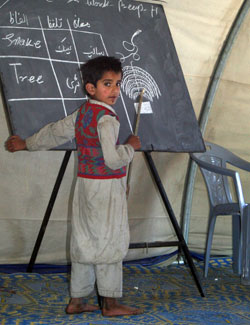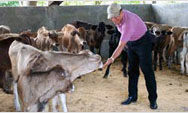You are here » Home » Telling Our Story
Success Story
Teachers from relief camp schools bring training and experience
Teachers Take Home Lessons Learned

| |
Photo: USAID/Kaukab Jhumra Smith
|
|
This student at a school in the Mehra Camp for displaced earthquake survivors in Pakistan leads his classmates in an English language exercise.
“Children understand better if you explain lessons with pictures,” said Islam-ur-Rehman, a language teacher who underwent USAID training.
|
Nearly 450 schools in Battagram District in Pakistan’s North West Frontier Province were damaged or completely destroyed by the devastating October 2005 earthquake. As winter approached, people from the remote Allai Valley descended from their mountain homes to the banks of the Indus River to seek shelter at the Mehra Relief Camp. With USAID’s help, 1,550 children attended one of the three schools at the camp, some of them for the first time. With the arrival of spring, Allai residents began returning to their homes and began clamoring for schools there to be rebuilt, in some remote areas, built for the first time.
Much of the credit for their enthusiasm about school lies with their teachers. Recruited from a mix of experienced older teachers and fresh high school graduates at the camp, the 28 teachers attended a three-day training workshop emphasizing the psychosocial needs of students traumatized by the quake, as well as the benefits of incorporating visual aids, role playing, and practical exercises into lessons.
As teachers head back home, they recall what they learned at the workshop. “Children understand better if you explain lessons with pictures,” said Islam-ur-Rehman, who teaches Urdu and English. He now uses role-plays and visuals in his lessons. “Before we scolded kids and tried to hit them,” said Khair-ul-Mukhtar, who taught at a government school before moving to the camp. “After the training, we stopped doing that.” He now includes group exercises in his lesson plans and makes sure to repeat information if a child doesn’t understand the first time. He called the three-day training “fantastic.”
The USAID program trained effective teachers who will now apply their skills to the changed circumstances students will find upon returning home. Their new approaches will be critical to supporting students as they adapt to life at home.
Print-friendly version of this page (553kb - PDF)
Click here for high-res photo
Back to Top ^ | 

